

Why Teens Behave the Way They Do: 3 Things You Should Know About Adolescent Brain Development – Main Street Counseling. I have been counseling adolescents for the past 13 years and have learned a lot about them during this time.

Parents often come to me because they aren’t sure what to do to help their teen make better choices. From my perspective, in order to help a teenager, you need to first understand how their brain operates. Here are three things to know! The adolescent brain isn’t fully developed. Why teenagers behave the way they do. Teen Brain: Behavior, Problem Solving, and Decision Making. Teen Brain: Behavior, Problem Solving, and Decision Making No. 95; September 2016 Many parents do not understand why their teenagers occasionally behave in an impulsive, irrational, or dangerous way.
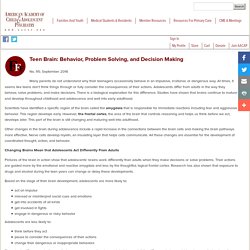
At times, it seems like teens don't think things through or fully consider the consequences of their actions. Adolescents differ from adults in the way they behave, solve problems, and make decisions. There is a biological explanation for this difference. Adolescent Psychology: What Makes Teens Different, And How Can Psychology Help? By: Joy Youell Updated December 17, 2020 Medically Reviewed By: Sonya Bruner Teenagers live in an exhilarating season of transition from childhood to adulthood.

This time can be full of exciting discoveries as teens develop their unique personality traits and skills. There are also challenges that accompany the process of becoming an adult. TheAdolescentBrain. The Teenage Brain Explained. 18 Areas Of Normal Adolescent Behavior. By: Ashley Brown Updated January 15, 2021 Medically Reviewed By: Melinda Santa.

Teen Behaviour - Metal Health Literacy. Typical vs. Abnormal Teen Behavior. Adolescence is a time of change.

The changes can be so dramatic that it leaves parents wondering if what they are seeing is just typical teen behavior or cause for concern. The American Academy of Child and Adolescent Psychiatry (AACAP) reports that the teenage years are marked by trying on independence through experimentation. When Typical Teenager Behavior Becomes Troubled Teenager Behavior. As teenagers begin to assert their independence and find their own identity, many experience behavioral changes that can seem bizarre and unpredictable to parents.
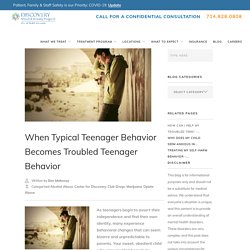
Your sweet, obedient child who once couldn’t bear to be separated from you now won’t be seen within 20 yards of you, and greets everything you say with a roll of the eyes or the slam of a door. As a parent, if you thought the “terrible twos” were bad, teenage years can be even worse in terms of your child fighting for their independence. Your teenage may engage in troublesome activities and exhibit poor moods that may seem unimaginable to you however at times, it can be difficult to decipher if these are just normal growing associated with teenagers or if these moods and behaviors are turning into warning signs of a troubled teen. What is typical adolescent behavior? Adolescents have the reputation for being surly, uncommunicative, moody, argumentative and flippant - sometimes all at the same time!
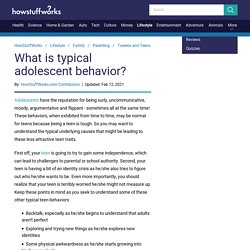
These behaviors, when exhibited from time to time, may be normal for teens because being a teen is tough. So you may want to understand the typical underlying causes that might be leading to these less attractive teen traits. First off, your teen is going to try to gain some independence, which can lead to challenges to parental or school authority.
Second, your teen is having a bit of an identity crisis as he/she also tries to figure out who he/she wants to be. Even more importantly, you should realize that your teen is terribly worried he/she might not measure up. Skinner’s Operant Conditioning: Rewards & Punishments. What Is Operant Conditioning and How Does It Work? Operant conditioning, sometimes referred to as instrumental conditioning, is a method of learning that employs rewards and punishments for behavior.
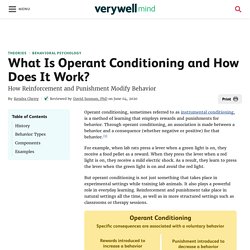
Through operant conditioning, an association is made between a behavior and a consequence (whether negative or positive) for that behavior.1 For example, when lab rats press a lever when a green light is on, they receive a food pellet as a reward. When they press the lever when a red light is on, they receive a mild electric shock. As a result, they learn to press the lever when the green light is on and avoid the red light. What Is Operant Conditioning? (and How Does It Explain Driving Dogs?) While second nature to many of us, driving a car is actually a fairly complex process.
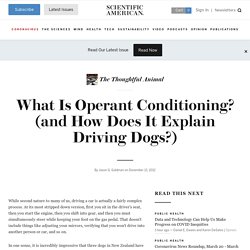
At its most stripped down version, first you sit in the driver's seat, then you start the engine, then you shift into gear, and then you must simultaneously steer while keeping your foot on the gas pedal. That doesn't include things like adjusting your mirrors, verifying that you won't drive into another person or car, and so on.
In one sense, it is incredibly impressive that three dogs in New Zealand have learned - in a fairly rudimentary way - to drive a car. They sit in the driver's seat, shift into gear, operate the steering wheel, and step on the accelerator. What is Operant Conditioning? Operant Conditioning Explained. Reinforcement vs Punishment Psychology [Examples] Reinforcement and punishment are often used as parenting tools to modify children’s behavior.
![Reinforcement vs Punishment Psychology [Examples]](http://cdn.pearltrees.com/s/pic/th/reinforcement-punishment-183049524)
Let’s review the difference between positive reinforcement and negative reinforcement, and the difference in outcomes between them. The Difference Between Positive And Negative Reinforcement In behavioral psychology, reinforcement is the introduction of a favorable condition that will make the desired behavior more likely to happen, continue or strengthen in the future1. Because the favorable condition acts as a reward, reinforcement is a reward-based operant conditioning. There are two types of reinforcement: positive reinforcement and negative reinforcement. The Difference between Positive/Negative Reinforcement and Positive/Negative Punishment.
February 5, 2013 7:40 pm Published by Kelley Prince M.A., BCBA In Applied Behavior Analysis, there are two types of reinforcement and punishment: positive and negative. It can be difficult to distinguish between the four of these. The Study of Punishment in Psychology. Punishment is a term used in operant conditioning to refer to any change that occurs after a behavior that reduces the likelihood that that behavior will occur again in the future. While positive and negative reinforcements are used to increase behaviors, punishment is focused on reducing or eliminating unwanted behaviors. Punishment is often mistakenly confused with negative reinforcement. The difference: Reinforcement increases the chances that a behavior will occur and punishment decreases the chances that a behavior will occur.
What Is Reinforcement in Operant Conditioning? One of the many different ways in which people can learn is through a process known as operant conditioning (also known as instrumental conditioning).1 This involves learning through reinforcement or punishment. The type of reinforcement used can play an important role in how quickly a behavior is learned and the overall strength of the resulting response. Understanding Reinforcement Reinforcement is a term used in operant conditioning to refer to anything that increases the likelihood that a response will occur.
Psychologist B.F. Discipline for Teens: Strategies and Challenges. When your child becomes a teenager, your parenting role is likely to shift. You may find yourself becoming more of a guide, rather than an enforcer. That’s not to say your child won’t need you to intervene when there are safety issues or that your teen won’t need consequences. But, by now, it’s OK to let your child make some choices on their own, even when you think it’s a bad choice. Typical Teen Behavior Teens like to test the limits of their independence.1 So don’t be surprised when your teen argues with you when you say no, or when they go behind your back to do as they please. A Mom’s Best List of Consequences for Teenagers. Appropriate Consequences for a Teen’s Bad Behavior. When a teen breaks the rules or behaves poorly, parents must step in and ensure that there is a consequence.
It’s important to understand that punishment is not the goal in a parent’s discipline, but rather providing a lesson. Learning from your mistakes is often life’s best method for growing and improving. Here are some ideas for appropriate consequences when your teen misbehaves: Ignore Mild Misbehavior Ignoring behavior can be a very effective consequence to minor irritations, but it’s very important to carefully choose which behaviors you will ignore. 21 Creative Consequences - iMom. Appropriate Punishments for Teenagers. How to Reward Your Teen for Good Behavior. Parenting A Teen Through Positive Reinforcement - Back On Track. Teenagers: 20 tips for good behaviour. When teens break the rules: options.